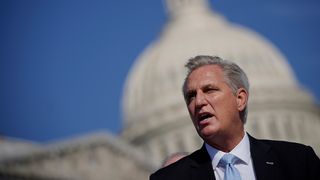In a year where America’s democratic alliances have been tested under the shadow of an increasingly autocratic China and the despotism of Vladimir Putin, the US-Australia relationship has made great strides. Advances at the bilateral level and minilateral initiatives like the Quad and AUKUS have brought both nations closer together and created new political imperatives for cooperation and collaboration. While the American public and many of their elected representatives in Congress supported efforts to strengthen and broaden alliance cooperation over the last year, the limited scope of engagement of the United States’ legislative institutions and a complex domestic political environment in the wake of the 2022 midterm elections present unique challenges and opportunities to this enduring relationship.
Considered co-equal to the executive branch, the US Congress has control over all federal funding, including defence spending, and is responsible for ratifying trade agreements. A newly elected Republican majority in the House of Representatives and a larger Senate Democratic majority have shared responsibility for ensuring the timely funding of defence programs, improving bilateral and multilateral trade in the Indo-Pacific and improving export control policies to better integrate the US and Australian defence industrial bases.
Advances at the bilateral level and minilateral initiatives like the Quad and AUKUS have brought both nations closer together and created new political imperatives for cooperation and collaboration.
Unfortunately, legislative progress will be hampered by the narrowly divided Congress and internal divisions between populists and mainstream members of the Republican party. While the Democratic-led Senate will largely support Biden administration policies, including in the Indo-Pacific, infighting within the Republican-led House could see it struggle to build consensus amongst its members or forge agreements with the Senate, heightening the risk that key legislation could be delayed.
Congressional dynamics
Most worrisome could be the arrival of a debt crisis as early as July. Some form of consensus must be reached between the parties and chambers over federal funding, most notably the raising of the US national debt limit to avoid severe economic disruption. Concerningly, this already complex debate will fall in the middle of a high-stakes period in Republican politics, as multiple candidates will soon begin to announce their intentions to run for president in 2024. The presidential campaign environment will predictably create policy hurdles and political distractions for Congress that will further distract from important policy formulation, including bipartisan foreign policy priorities like AUKUS. In turn, this could complicate the Biden administration’s capacity to action its stated priorities. That said, while this politically charged partisan environment will make cooperation more difficult, political alignment and opportunity for bipartisan cooperation can still be possible on select issues and must-pass legislation, including the defence budget.
Effective legislating in such an environment depends on the steady and pragmatic leadership of senior figures in both parties, but new Republican House committee chairmen moving beyond their oversight roles and engaging in pragmatic bipartisanship is essential. For issues affecting US-Australia relations, this work will be led by new chairmen of House and Senate national security committees, as well as a new House China-centric committee, which are all taking a more hardline approach towards China on defence and economic issues. This is in keeping with a tradition of Congressional bipartisanship on most big-ticket foreign policy issues. Indeed, for many years, Democrats and Republicans have found significant alignment on security and economic issues when it comes to China policy, buttressed by decades-long formal congressional commitments to the security of Taiwan and human rights in East Asia. Indeed, the Taiwan Relations Act of 1979, which is the legislative foundation for the US-Taiwan relationship, was one of the most notable foreign policy initiatives generated by the US Congress without executive branch support. More recently, the introduction of the Pacific Deterrence Initiative in 2021, designed to shore up America’s military position in Asia, was driven by a similar bipartisan agreement.
While congressional voices may align with Australian voices on defence and security issues, differing views on economic and trade issues – particularly those involving China – may foment friction between the allies.
At the same time, internationalist bipartisanship over Indo-Pacific security is challenged by isolationist bipartisanship over trade policy. US industrial policy and trade scepticism will continue to strengthen a foothold with populist Republicans and most Democrats pushing for “Buy America” or “America First” policies, as well as potentially put pressure on US allies amid considerable congressional ambitions for further decoupling from China. While congressional voices may align with Australian voices on defence and security issues, differing views on economic and trade issues – particularly those involving China – may foment friction between the allies.
The new China committee
In the House of Representatives, these trends are manifesting in the newly organised bipartisan “Select Committee on the Strategic Competition Between the United States and the Chinese Community Party.” Arguably the first bipartisan act of the new Congress, this grouping is tasked with looking into and highlighting key policy issues within the broad jurisdiction of US-China competition. It is chaired by Republican Representative Mike Gallagher of Wisconsin, a senior member of the House Armed Services Committee and Democratic Representative Raja Krishnamoorthi of Illinois, a member of the House Intelligence Committee. Rep. Gallagher is a long-time friend of Australia’s who, along with his Democratic colleague from Connecticut, Rep. Joe Courtney, will continue to lead both the Friends of Australia Caucus and the newly formed AUKUS Caucus. If successful in maintaining their bipartisan focus, the China committee, and to a lesser extent these caucuses, should broaden awareness of US and Australian interests in the Indo-Pacific to less engaged parts of Congress, increasing the chances that these priorities could be pursued through legislative action.
Rep. Mike Gallagher is a long-time friend of Australia’s who, along with his Democratic colleague from Connecticut, Rep. Joe Courtney, will continue to lead both the Friends of Australia Caucus and the newly formed AUKUS Caucus.
The China committee presents both opportunities and challenges for the Biden and Albanese governments. As it prioritises exposing Chinese aggression and highlighting the need for a robust deterrent against the PRC, it will also form another base of support within the US Congress for US-Australian relations. In the near term, the committee will likely work to broaden support for the AUKUS agreement, including by pushing for better interagency cooperation and building momentum in Congress around limited ITAR and export control reform for Australia. As it seeks to strengthen US engagement in the Indo-Pacific more broadly, the committee will also seek to process lessons from the Ukraine war to better deter China from invading Taiwan, particularly by highlighting the need for an adequate munitions stockpile. The committee will also likely find bipartisan points of criticism, challenging the administration to take an even more aggressive approach towards the PRC. For instance, Rep. Gallagher has already called for creating a framework for “selective decoupling” that would more aggressively separate the US economy from Chinese entities engaged in forced technology transfer, intellectual property theft or connected to human rights abuses or military modernisation.
However, the ambitious agenda of the China committee will still likely have to overcome jurisdictional hurdles and institutional friction. The creation of a region-specific committee is unprecedented and will have to compete for attention and jurisdiction with permanent standing committees such as the House Foreign Affairs, Financial Services and Armed Services Committees and will not have a counterpart to work within the Senate. But, if leveraged appropriately, the committee’s cross-jurisdictional mission, which includes domestic and trade policies, could present an opportunity if it is able to cooperate with and support the work of other committees with legislative authority.
AUKUS
Australian interests are also directly implicated by congressional support for the AUKUS agreement, which continues to enjoy bipartisan support across the national security committees, and especially the House and Senate Armed Services committees. Though senior Congressional leaders have aired concerns about the potential effects of the agreement on the US submarine industrial base, these concerns have been offset by robust statements of support from these same figures. Still, the US industrial base concerns are real and longstanding and will need to be addressed to ensure that political momentum translates to practical progress.
For AUKUS to succeed, however, there is still much work to be done to engage Congress beyond the Armed Services Committees. Indeed, the congressional focus on AUKUS currently mirrors the Department of Defense-centric approach of the Biden administration, even when nuclear energy, export controls, financing mechanisms and appropriations all fall under the jurisdiction of different committees that have, on available evidence, not measurably engaged or been engaged, on AUKUS. As the agreement matures, particularly after the expected announcement of the optimal submarine pathway this month, these committees will all play a role in facilitating policy solutions and securing long-term domestic political support for AUKUS. In an ideal future, such support could be leveraged by Australian policymakers to drive progress on bilateral defence trade, force posture and security cooperation priorities.
Though senior Congressional leaders have aired concerns about the potential effects of the agreement on the US submarine industrial base, these concerns have been offset by robust statements of support from these same figures.
Yet the difficult legislative environment facing Congress may limit the pace at which AUKUS and other bilateral security priorities could progress. A growing group of populist Republicans and progressive Democrats are looking for ways to cut or limit defence spending, further complicating already tenuous budget negotiations. A legislative stalemate this summer over the budget could cap defence spending and constrain the ability of the Pentagon to start new programs, with material and reputational costs for America in the Indo-Pacific. A limited defence budget would also affect investment in the defence industrial base in both material and personnel and could exacerbate supply chain concerns for submarines and other critical technologies central to AUKUS and the US-Australia alliance more broadly. These risks heighten the importance of educating Congress on the impact that its budget decisions will have on the US-Australian partnership.
The domestic political environment which has strengthened bipartisan support for both a strong US industrial policy and “selective decoupling” may present additional challenges to the bilateral relationship. Congressional pressure on these issues may extend to Australia and other allies in the region, potentially creating more economic and diplomatic friction. For example, Congress could potentially pressure the Biden administration to leverage progress on AUKUS or other export control concerns to push the Australians to more aggressively prosecute Chinese companies in Australia with ties to the PLA or forced labour. In addition, “Buy America” and “America First” sentiments in the United States could further complicate efforts to integrate the US and Australian defence industrial bases, and hinder progress on American regional trade initiatives. Finally, an increasingly antagonistic congressional position on China may contribute to rising regional tensions, which will implicate Australia as a regional stakeholder seeking to reassure mutual partners who worry about an increasingly antagonistic US-China relationship.
Nonetheless, these possible barriers should not diminish the importance of the strategic alignment that our countries share nor the close friendship and political support that exists across the Pacific. A clear-eyed and bipartisan focus in the US Congress that is aware of Australia’s contributions and political limitations will only improve dialogue and improve mutual security. The same goes for Australia as it must find ways to constructively engage the United States around concerns about China’s state influence over its industries and the political reality of economic protectionism in the United States. The charge to both nations is to build on last year’s momentum and double down on efforts to overcome the inevitable barriers that present themselves for such ambitious efforts.






